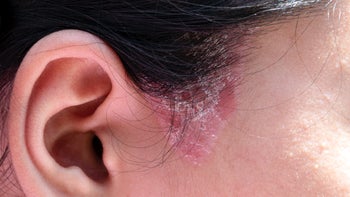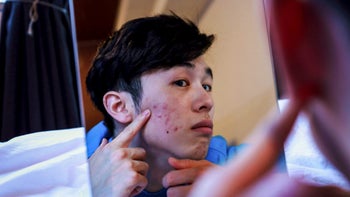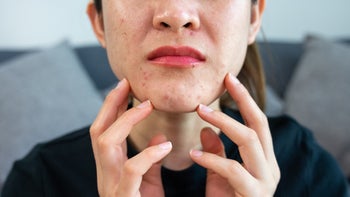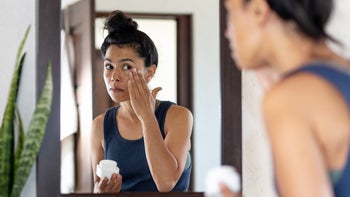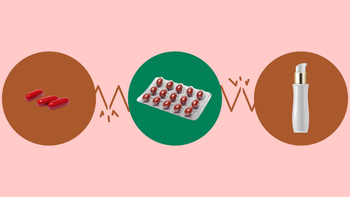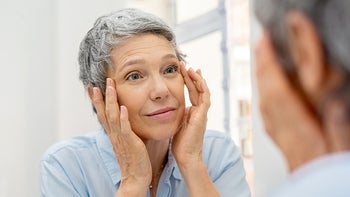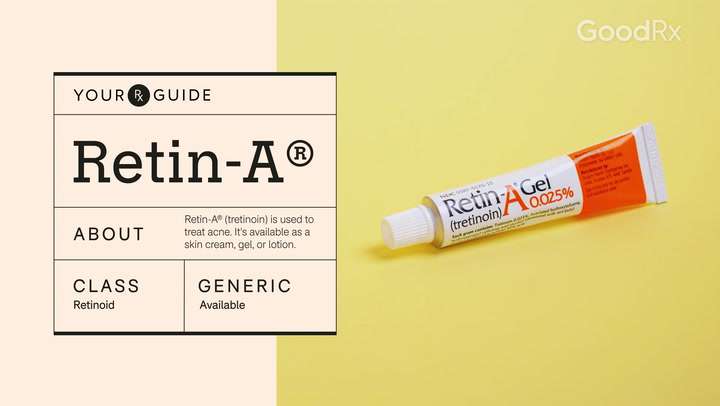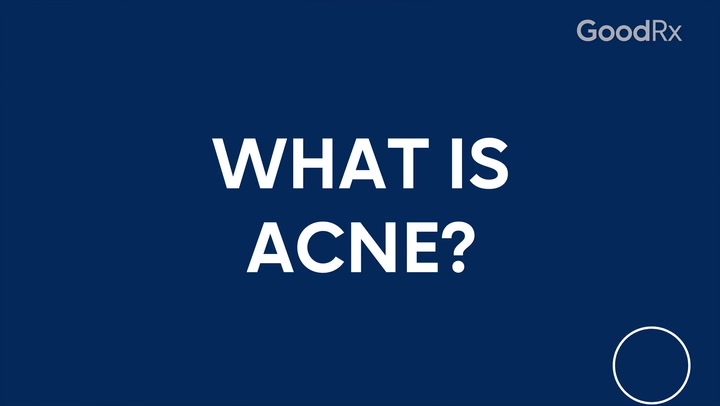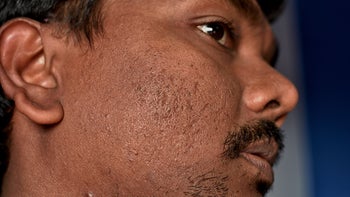
Retinoids for Acne: Are They Safe?
Yes, all retinoids are safe. But pills have more side effects than creams.
Retinoids are medications related to vitamin A. They’re very effective acne treatments because they prevent clogged pores by helping the skin to exfoliate, or renew. Topical retinoids (that you apply directly to the skin) are very safe to use. Their main side effect is skin irritation, like redness, peeling, and burning. You can minimize this by following instructions for proper use and moisturizing regularly.
You can also take a retinoid orally (as a pill). Isotretinoin (Accutane) is a pill retinoid that’s been used to treat acne for 40 years. It treats severe cystic acne and can prevent permanent scarring. Isotretinoin has many risks, like birth defects and liver inflammation. These risks can be lowered with regular checkups and bloodwork.
Studies have not shown that isotretinoin causes depression, suicide, or inflammatory bowel disease. For the right person, isotretinoin can be a safe and life-changing treatment for severe acne.
 BEST ANSWER
BEST ANSWEROur answer is in line with current guidelines from the American Academy of Dermatology and the Global Alliance to Improve Outcomes in Acne.
Topical and oral retinoids have been used to treat acne for over 40 years. Numerous clinical studies support our answer.
14
15
14
15
Our answer is in line with current guidelines from the American Academy of Dermatology and the Global Alliance to Improve Outcomes in Acne.
Table of contents
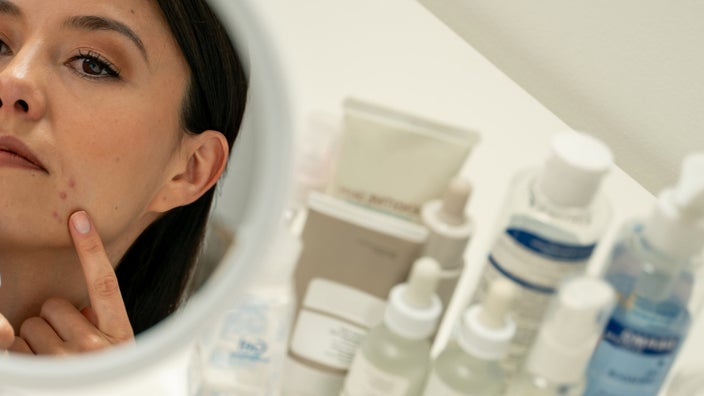
Everyone has heard of acne — and most people have experienced it at some point. It’s those irritating skin pimples that come out day after day and often when you least want them to. Acne happens when skin pores get blocked by excess oil, dead skin cells, and bacteria.
Acne is most common in teenagers, but it can also affect infants, children, and adults. It’s not clear why some people get it and others don’t, but it likely comes down to genetics and hormones.
Acne can make you feel isolated and frustrated, especially when it affects the face and other visible areas. Despite the many over-the-counter (OTC) remedies available, sometimes these just aren’t enough. That’s where retinols and other retinoids come in.
One Prescription + One Pump + Once a Day
Introducing CABTREO: the treatment that has clindamycin phosphate, adapalene, and benzoyl peroxide all in one topical application. Now cash pay patients pay no more than $100 using GoodRx.

Retinoids are highly effective treatments for all types of acne. With mild acne, retinoid creams may be enough to prevent pimples from forming. For more severe, scarring acne, retinoid pills can be a game changer when nothing else has worked. But retinoids come with some pretty strict instructions for how to use them. And that can make people worry about their safety.
Fortunately, people have safely used retinoids for decades. With the right follow-up and precautions, retinoids are definitely worth the slight hassle. They remain one of the most cost-effective treatments for hard-to-treat acne. Let’s dig into the evidence.
What are retinoids?
The term “retinoids” describes naturally occurring vitamin A (retinol) and all chemicals related to vitamin A. In the body, retinol is converted to retinoic acid — a more powerful form of vitamin A.
You can apply retinoids directly to the skin (topical) for anti-acne and antiaging effects. Or you can take it as pills to treat severe acne. Some retinoid creams are OTC, but most are prescriptions. Retinoid pills are only available as prescriptions and need close monitoring.
Topical retinoids
Topical retinoids work well for treating acne, and they’re very safe to use. To avoid side effects, it’s important to follow instructions and use them correctly.
In 2016, the FDA approved one retinoid gel — adapalene 0.1% — for OTC use. It’s a lower-strength version of a higher-strength, prescription-only retinoid.
Read more like this
Explore these related articles, suggested for readers like you.
There are four prescription-strength retinoids for acne:
Tretinoin (Retin-A)
Adapalene (Differin)
Tazarotene (Tazorac)
These come in creams, gels, lotions, and foams of different strengths.
Isotretinoin (Accutane)
There is one oral retinoid medication — isotretinoin. It was first sold under the brand name Accutane and has been used to treat acne and other skin problems for 40 years. It’s FDA approved to treat severe cystic acne in people 12 years and older — often with great results. Isotretinoin is available as a generic medication and under other brand names, like Absorica and Claravis.
How do retinoids work to treat acne?
Retinoids are one the most effective treatments for all types of acne. This is because they prevent pimples from forming. They do this by tackling pimples from every direction:
Retinoids promote the growth of healthy skin cells.
Retinoids remove dead skin cells.
Retinoids lower oil production.
Retinoids lower inflammation.
Because of how they work, retinoids often make acne a little worse before it gets better. This is normal, and it means the medication is working. So try to trust the process and stick with it.
Benefits of topical retinoids
Topical retinoids are one of the main treatments for acne in adolescents and adults. They come in different strengths and formulations (like creams, gels, and foams). This makes it easier to find the best topical retinoid for you. And topical retinoids lighten the red or brown spots left on the skin after acne heals.
Benefits of isotretinoin pills
Isotretinoin works to treat severe acne when other treatments don’t work.
After just one course of treatment (typically 4 to 5 months), 85% of people permanently clear their acne. Isotretinoin also helps prevent the permanent scars that can develop when severe cystic acne is not treated.
Risks and side effects of retinol creams
Retinoid creams come with some short-term skin side effects. You’re less likely to experience these if you use the medication correctly, so it pays to be cautious. Don’t apply too much at once. And start out slowly, using the cream every other day or a few times a week.
Common risks and side effects of retinoid creams
Skin irritation is the most common side effect of topical retinoids. You might notice:
Redness
Peeling
Dryness
Itching
The higher the strength of a retinoid, the more likely it is to cause irritation. Not everyone gets irritated skin. But some people, like those with sensitive skin, are more likely to get it. If this is the case for you, slow down on how often you use the cream, and add in a moisturizer.
Sensitivity to the sun
Another typical side effect of topical retinoids is that the skin becomes more sensitive to the sun. That means you'll burn faster than you’re used to. So, when using a retinoid cream, be sure to apply sunscreen with an SPF of at least 30 every day.
Side effects of Accutane
Isotretinoin (Accutane) can also cause side effects. Many of these are minor and go away when the medication is stopped. But some are more significant. Anyone taking isotretinoin has to be strictly monitored with regular blood tests and checkups to lower the risk of harmful side effects.
Some side effects depend on the dose, meaning you’re more likely to experience them with higher doses of medication. If you’re struggling with any of these symptoms while taking Accutane, be sure to let your provider know. These are nine of the more common side effects of isotretinoin:
Dry skin, hair, and mucous membranes: Isotretinoin can cause skin dryness. People often notice skin irritation, chapped lips, and sore eyelids. Isotretinoin can also temporarily thin your hair and make your skin more sensitive to sunlight. Protect your skin from the sun with clothing, and use daily sunscreen with an SPF of 30 or higher. Regular moisturization can help soothe dry skin.
Muscle and joint pain: Isotretinoin can cause pain and tenderness in the joints and muscles, which can lead to back pain. In rare situations, muscle tissue can become inflamed and start to break down, causing a serious condition (rhabdomyolysis). If you develop muscle pain that is severe or doesn’t go away, stop taking the medication and notify your provider right away.
Dry eyes and blurry vision: Isotretinoin can cause blurry vision or a slight change in vision. Some people may not see as well in the dark or find it harder to wear contacts because of dry eyes. Artificial tears can help with dry eyes. If you experience any vision changes, stop taking the medication and let your provider know right away.
Nosebleeds: Dry nasal passages can make nosebleeds more likely.
Headaches and tiredness: Isotretinoin can cause headaches and tiredness. In rare situations, it can cause increased pressure in the brain (more on this below).
Liver or pancreas inflammation: Isotretinoin may cause liver or pancreas inflammation in some people. Regular bloodwork helps monitor this, but if you develop stomach or lower back pain, stop taking the medication and let your provider know right away. It’s also important to avoid alcohol while taking isotretinoin because it can increase the risk of liver inflammation.
Hormonal changes: Women taking isotretinoin can develop abnormal periods.
Raised blood sugar and cholesterol: Isotretinoin can also increase blood sugar, cholesterol, or triglycerides (a type of cholesterol). You’re unlikely to notice this, but it’s one of the reasons people need regular bloodwork when they take isotretinoin.
Skin infections: Isotretinoin increases risk of skin infections because of dry skin. Regular moisturization can lower this risk. Let your provider know if you develop skin cuts that don’t heal or ooze fluids.
Serious risks with Accutane
Beyond the above side effects, isotretinoin has some more severe risks. Some of these — like birth defects — are well established. Others — like depression — are just associations because they haven’t been definitively proven. In any case, these possible risks are serious and important to know about if you’re considering isotretinoin as a treatment for acne.
Severe birth defects
Isotretinoin is teratogenic, meaning that it causes severe malformations in a developing baby. If you’re taking isotretinoin and there’s a chance you could get pregnant during treatment, you’ll need to:
Register with the national program iPledge.
Get regular bloodwork and pregnancy tests throughout your treatment.
Use two forms of birth control during your treatment (if you’re sexually active).
High pressure in the brain
Rarely, isotretinoin can increase pressure in the brain. This is called idiopathic intracranial hypertension. Get immediate medical attention if you have a severe headache that won’t go away, a sudden change in vision, nausea and vomiting, or new dizziness.
Isotretinoin can react with some common medications, including certain antibiotics like tetracyclines. This interaction can increase the risk of increased pressure in the brain. Tell your healthcare provider about any medications and supplements you’re taking before starting isotretinoin.
The link between accutane, depression, and suicide
Some reports have linked isotretinoin use to mood changes, including depression and an increased risk of suicide. This has raised concern that using isotretinoin can lead to depression and suicide in people who use it.
This is a particularly tricky issue because research shows that acne can cause depression and anxiety. So it’s hard to know if it’s the acne or the isotretinoin (or even something else) that leads to these mood changes.
Many different studies have looked at this question, including a recent large study that combined separate smaller studies and looked at over 9,000 people taking isotretinoin. So far, these studies don’t show a definite link between isotretinoin use and depression. In fact, some studies show that using isotretinoin to improve acne can actually help improve the symptoms of depression.
Here’s the key takeaway: The association between isotretinoin, depression, and suicide is far from certain. More research is needed to provide clarity. Dermatologists take any signs of depression or mood changes very seriously, and they closely monitor any person taking isotretinoin.
The link between accutane and inflammatory bowel disease
Inflammatory bowel disease (IBD) is a type of inflammation that affects the gut. It includes conditions like ulcerative colitis and Crohn’s disease.
Some scientific studies have shown a possible relationship between IBD and isotretinoin. But others have not, including a more recent study that combined the results of six different studies.
Here’s the key takeaway: So far, studies don't prove that isotretinoin causes (or doesn’t cause) IBD. More studies are needed to see what relationship, if any, exists between isotretinoin and IBD. Talk with your healthcare provider about your symptoms if you’re considering isotretinoin and have IBD or related problems like diarrhea.
Are retinoids safe in pregnancy?
Isotretinoin is not safe to take in pregnancy, but the evidence on topical retinoids isn’t as clear. In general, it’s best to avoid retinoid creams, too. Even though the evidence is less clear, most healthcare providers recommend against it, unless it’s absolutely necessary.
Alternatives to retinoids
You should not take isotretinoin if you’re pregnant, trying to get pregnant, or breastfeeding. People with certain medical problems, like liver disease, may also want to avoid taking isotretinoin.
Depending on your situation, some of these alternative treatments may be better options than others. Your provider can help you decide the best treatment plan for you.
Examples of other effective topical medications for the treatment of acne include:
Examples of oral medications for acne treatment include:
Antibiotics (like tetracycline, doxycycline, and minocycline)
Hormonal treatments for women (like birth control pills and Aldactone)
The bottom line
Retinol and other retinoids are common and effective treatments for all forms of acne. For most people, topical retinoids are enough to do the trick, especially when combined with other treatments. Their main side effect is skin irritation, which is easy to manage. For more severe acne, isotretinoin (the retinoid pill) can be a life-changing option. It’s associated with more serious side effects, like birth defects and liver inflammation. But with proper monitoring, it’s a very safe and effective option.
Retinoid creams are safer than the pill, and they come with fewer side effects. While the pill can have more serious side effects, careful monitoring with bloodwork and provider checkups make them less likely to happen.
Why trust our experts?


References
AcneSupport. (n.d.). Retinoid.
Alhusayen, R. O., et al. (2013). Isotretinoin use and the risk of inflammatory bowel disease: A population-based cohort study. The Journal of Investigative Dermatology.
American Academy of Dermatology Association. (2021). Isotretinoin: Overview.
American Academy of Dermatology Association. (2021). Isotretinoin: The truth about side effects.
American Academy of Dermatology Association. (n.d.). What can clear severe acne?
Araç, D., et al. (2020). Indicators of isotretinoin-induced myopathy: Neutrophil/lymphocyte ratio, cobb angle of spine. Middle Black Sea Journal of Health Science.
Crockett, S. D., et al. (2010). Isotretinoin use and the risk of inflammatory bowel disease: A case-control study. The American Journal of Gastroenterology.
Droitcourt, C., et al. (2019). Risk of suicide attempt associated with isotretinoin: A nationwide cohort and nested case-time-control study. International Journal of Epidemiology.
Huang, Y. C., et al. (2017). Isotretinoin treatment for acne and risk of depression: A systematic review and meta-analysis. Journal of the American Academy of Dermatology.
iPledge. (n.d.). Safety notice.
Kaplan, Y. C., et al. (2015). Pregnancy outcomes following first-trimester exposure to topical retinoids: A systematic review and meta-analysis. The British Journal of Dermatology.
Lee, S. Y., et al. (2016). Does exposure to isotretinoin increase the risk for the development of inflammatory bowel disease? A meta-analysis. European Journal of Gastroenterology & Hepatology.
Li, C., et al. (2019). Use of isotretinoin and risk of depression in patients with acne: A systematic review and meta-analysis. British Medical Journal.
MedlinePlus. (2021). Idiopathic intracranial hypertension.
Sudström, A., et al. (2010). Association of suicide attempts with acne and treatment with isotretinoin: Retrospective Swedish cohort study. British Medical Journal.
Thiboutot, D. M., et al. (2018). Practical management of acne for clinicians: An international consensus from the global alliance to improve outcomes in acne. Journal of the American Academy of Dermatology.
Wysowski, D. K., et al. (2001). An analysis of reports of depression and suicide in patients treated with isotretinoin. Journal of the American Academy of Dermatology.







